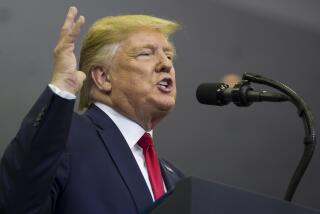U.S. Problems As Tough As Saddam--and Zucchini
- Share via
JAPAN
“For Japan-U.S. relations, everything will be fine whichever party wins. The Democratic Party has able people, and it is a mistake to think that when a Democratic administration takes over, things will become protectionist and Japan-U.S. relations will worsen.” --Asahi Shimbun
“Japan will be isolated if Europe and North America form their own economic blocs. If Japan does not want that to happen, it will be forced to match moves in Europe and North America by making the Asia-Pacific region into a free-trade zone.” -- Editorial, the Daily Yomiuri
“It is not too much to say that every single problem which the U.S. faces has a ‘difficult enemy’ more formidable than Saddam Hussein.” --Sankei Shimbun
NEW ZEALAND
“We all know now that Mr. Quayle cannot spell potato (or at least not all the time). Proving it on television can’t have been much fun for him, though at least he didn’t have a go at asparagus, broccoli, courgette or zucchini.” --Editorial, Nelson Evening Mail
“By the time they cast their votes in early November (Americans) will have been battered into submission by the Republican and Democratic campaign machines. One can sympathize with those who can afford to flee the United States for six months every four years to escape this nauseating and costly ritual.” --Editorial, the (Wellington) Evening Post
THAILAND
“The message is clear. It is only political insouciance that dictates American attitude to the suffering in Yugoslavia, yet at the slightest provocation in Iraq, the United States and its allies are quick to look to the gun.” --Editorial, the Nation, Bangkok
PHILIPPINES
“It is inevitable that the redefinition of our relationship with the United States requires also a redefinition of our concept of nationalism. The concepts that informed our nationalism of the 1950s and 1960s . . . are already anachronistic. There is a way to strike a balance between our national interests, in both trade and security, and those of the United states, and at the same time expand the basis of our relationship with other countries.” --Editorial, the Manila Chronicle
SINGAPORE
“(A Clinton presidency) looks like an inward-looking administration that could be worrisome for the Asia Pacific, especially given the plan for the draw-down of U.S. military forces in the region. The United States is the only benign power accessible to all.” --Carolina Hernandez, commentary, Straits Times
“(Mia Farrow) and (Woody) Allen kept separate homes. So chic, civilized and avant garde. Yet what kind of values were being imparted to children brought up in such a menage? . . . Minus the magic and the hype, there was a couple bringing up innocent children in the most irresponsible way. Is it surprising that one has turned out to be a Rosemary’s baby?” --Tan Sai Siong, commentary, Straits Times
AUSTRALIA
“President Bush’s farm-export subsidies may cost Australian farmers $A500 million in the coming years. . . . What can Australia do? It cannot hope to dissuade Mr. Bush from buying the votes of U.S. farmers. The President is still well behind Mr. Clinton in the public-opinion polls, and is apparently becoming less fussy about how he closes the gap.” --Editorial, the Sydney Morning Herald
CHINA
“Why are so many state legislators in America hanging up their hats? . . . They all have one thing in common . . . they feel it’s no good to be a legislator in tough times. Some . . . have even received serious threats . . . In 1991 nearly all legislators from Connecticut who voted to raise taxes received ‘kill ‘em all’ telephone threats. Some legislators’ homes were even riddled with bullets. This reflects the intensification of economic and societal contradictions in America.” --Analysis, People’s Daily, Beijing
More to Read
Sign up for Essential California
The most important California stories and recommendations in your inbox every morning.
You may occasionally receive promotional content from the Los Angeles Times.












